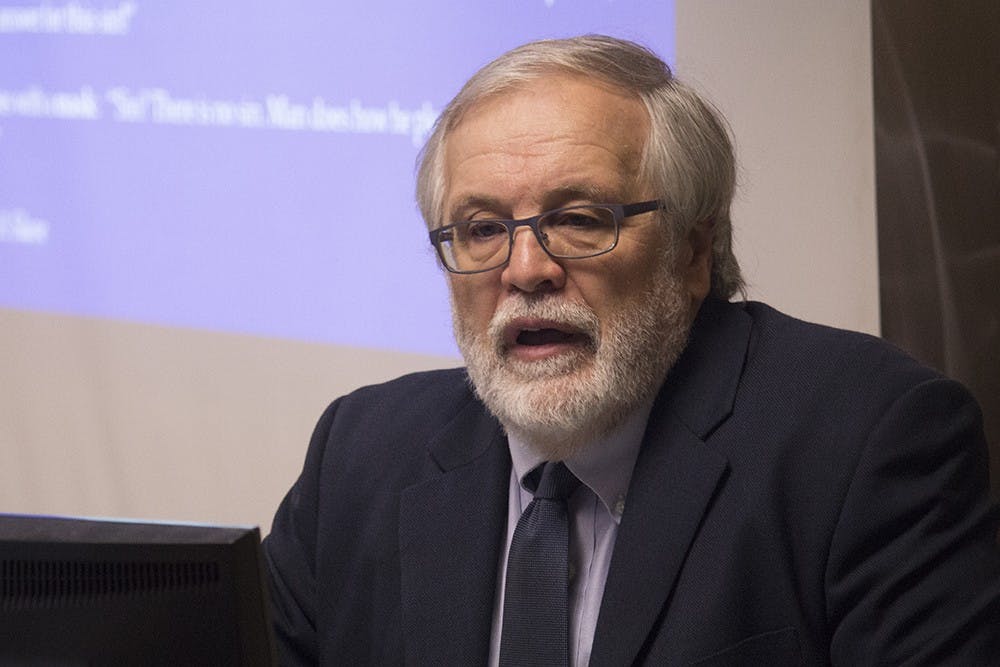Then, when his wife was pregnant with their first child, Duncan’s opinion changed. From the time their son was conceived, he and his wife thought of him as their baby.
“We started thinking about that child of ours growing in the womb,” he said. “And as I thought about things like that, I said, ‘You know, this child could be aborted.’ This child that we already recognize as a living human being, we’re already saying ‘our baby,’ could be legally aborted.”
Once he started thinking that abortion was not just about liberty, but also about someone’s life, he changed his mind.
Duncan spoke in a lecture Monday organized by the Federalist Society, in conjunction with Advocates for Life and Christian Legal Society, about controversy surrounding abortion and, more recently, Planned Parenthood. Duncan, however, said his intentions were not to change anyone’s opinions or views, but instead to encourage people to think about the topic.
“Once the issue gets decided by the Supreme Court, we stop thinking about it,” Duncan said. “I think this is too important to stop thinking about it.”
Duncan discussed how laws can “mask” the identity of people treated harshly by the law. He said this happens when someone’s humanity is hidden by rules and legal concepts, and he used slavery in the United States as an example.
“The mask that the legal system used to disavow the human dignity of slaves was the mask of ‘property,’” Duncan said. “The mask of property was what allowed champions of liberty, such as George Wythe and Thomas Jefferson to own slaves, and to accept the power of the law.”
Duncan’s main argument during the lecture used the case of Kermit Gosnell. Gosnell was a doctor convicted of three charges of murder in 2013 for delivering live babies and then killing them in what he considered to be late-term “abortions.” Duncan’s point was that although legal language classifies a fetus in utero as a potential life, when the “mask” is lifted, such as when the fetus is delivered, he said people see the fetus as a baby.
“The masks of the law determine whether it is murder or fundamental right. Kill the baby outside the womb, the mask is gone. It is murder and Gosnell is a murderer,” Duncan said. “Kill the same baby inside the womb, a few seconds earlier, the baby is hidden by the mask of ‘potential life,’ and it is a constitutional right, and Dr. Gosnell is a hero ... a champion of constitutional rights.”
Rebuttal commentary was given by Ryan Scott, professor of law with the Maurer School of Law. Though professor of law Jody Madeira was scheduled to provide response, she could not attend.
Scott focused his rebuttal on the idea that many states do actually have laws protecting fetuses in utero from harm. For example, in some states, if a mother is beaten and the fetus dies, the offender can be charged with murder.
The masks of the law then, Scott said, obscure the lives of fetuses in some instances and not others, based on intention and context.
Sometimes, he said, the distinctions between what is legal and what is not when it comes to abortion seem arbitrary, but overall the lax punishments for illegal abortions, relative to the punishments for murder, reflect an intuition that abortion, even if it is illegal, is not as bad as murder.
Scott said there are two questions which make abortion a difficult moral decision: when does life begin and what reasons are good enough to end a life or potential life?
“There’s a continuum of reasons (why someone would seek an abortion) and I think those continuum of reasons is just as difficult in the abortion debate as this question of whether we’ve unmasked a real human being or not,” Scott said.
Duncan discussed how even many pro-life people make exceptions for when abortions are acceptable, such as incest or rape, reflecting the overall ambiguity of abortion decisions.
“I think the unmasking process is at least only a partial explanation of why we’ve ended up in the state of abortion laws that we have today,” Scott said.






